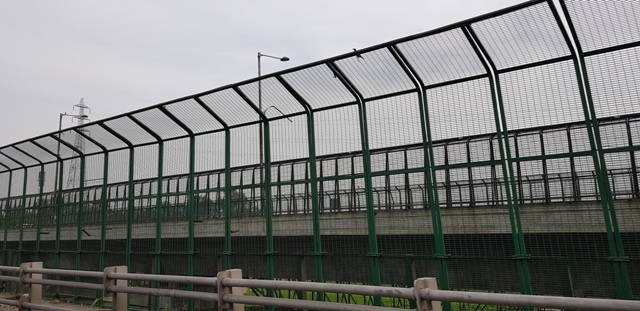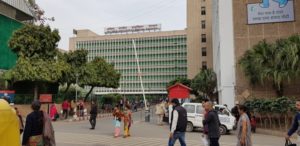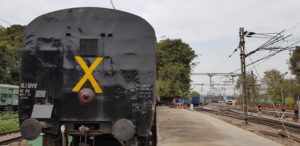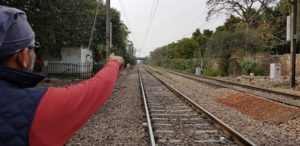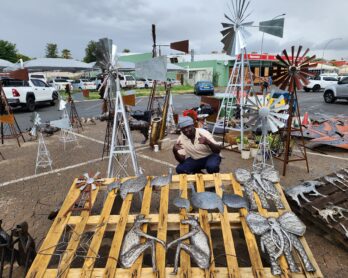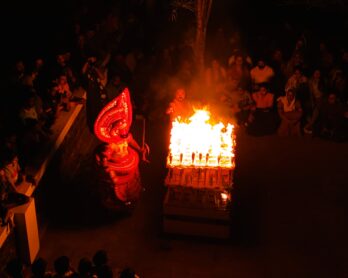Jump / AIIMS
“On the bright side, the ride to the mortuary will be considerably shorter,” she said as she stood with one hand on her plump hips. She looked at her husband and even though she didn’t detect any mirth she laughed as she breathed hard.
“We are going to die woman and you cannot be quiet for a full minute?” He asked gruffly, succeeding with some effort to suppress a smile that crept into his lips. He had always marvelled at his wife’s funny sense even though he never acknowledged it. Mostly jejune or inopportune it still never failed to lighten the air. He thought maybe he should tell her before it was too late. But they were soon stopped at the landing where a metal grill blocked the way.
“Show me your passes,” a watchman said without looking up from something he was watching on his mobile phone in a tone so tough that belied his painfully thin frame.
The couple had walked into the tallest building – or what they thought was the tallest – at the All India Institute of Medical Sciences so that they could jump from the top. They had gotten off the bus at Yusuf Sarai bus stop and had a cup of tea and samosa from a roadside vendor. They were quiet through what they knew was their last meal together; their eyes locking occasionally while they chewed the potatoes longer than necessary. When you are about to end something momentous you find ways to linger. Creating memories, happy or sad, is a human conditioning. Through the cacophony of arriving ambulances and wailing people they made their way to an already congested lift from which they were asked to step out as a human-shaped bandage was rolled in on a wheelchair. Two bystanders jumped inside claiming to be patient attendants and the lift refused to budge. She took his hand and led him towards the staircase. It might have been her way of creating memories even when time was limited.
“The floor above is the ICU and only those with passes are allowed through,” the watchman continued, still glued to the screen.
“We forgot our passes in the canteen,” she said.
“We just want to go to the rooftop,” he informed.
Both spoke at the same time.
The watchman paused the video and looked up. This time his voice sounded close to a threat.
“So, what will it be? Canteen or rooftop?”
“Are you always hung up on these things?” She asked the vigilant staff. “Because if you were, no imposter would have pranced around the prestigious AIIMS for a full five months claiming to be a doctor and treating people.”
The husband guffawed – it was an apt and timely comeback. The incident was true, had happened less than a year ago and was widely covered by the media. Slightly deflated of the muscle in his voice the watchman stared at the couple with absolute contempt now and stood up hurriedly to physically prevent them from passing through.
Due to a grim economic atmosphere, more than 11 million jobs were lost in India in 2018 alone. The media industry itself witnessed massive downsizing by the thousands – here was a sector where lay-offs had become the norm. A prominent media company owning a basket of news and entertainment channels bought over by a giant conglomerate began its ‘cost-cutting’ efforts by firing around 500 staff in one go – the last tranche of about a 100 were shown the door towards the end of 2018.
Train / New Delhi Railway Station
The couple reached Connaught Place from AIIMS from where they walked along a leafy bylane towards the New Delhi Railway Station. It was the way used by ticket checkers and other railway staff, a shortcut, and by vendors who made a living selling stuff aboard the trains during day trips and railway platforms. Once dusk fell, this was also where you scored drugs. Low-lying buildings with peeling walls faced both sides of the street. There were iron lampposts which looked like twin-bracketed ones cut into halves and plonked into the ground at intervals. A few of them leaned on the adjacent ones courtesy of the Jal Board or water authority. At the end of the lane was a shapeless building which was decked up with sheeny, synthetic saris into a function hall.
As they walked towards a side gate which opened to the farthest platform from the main entry she was unusually quiet. He felt this had nothing do with their purpose but more on his refusal to buy her rajma chawal from Parashar. He didn’t tell her that he didn’t have the money.
“That is the most famous rajma chawal you get in Delhi,” she had said and persisted “and this could be our last meal together.”
For a fleeting moment he wondered whether she gleaned the information off a food guide given by a friend or from somewhere else.
“We already had our last meal,” he replied curtly.
They entered the railway tracks without being challenged and walked in the direction opposite to where the platforms ended. Railway lines were arranged parallel to each other, plentifully, almost mocking them with choice. On the slopes from where the platforms ended and open tracks began, water bottle and biscuit sellers sat gathering energy before the next train arrived. They walked till they reached a stretch of land drenched in black oil and latticed by gauge steel, catenaries loomed over, an aerial pergola. A fat lady slept under a tree with her basket of bananas. As they looked around, the fruit vendor sat up fishing a mobile phone from within her overflowing blouse. Cupping the phone screen with one hand, she peered at it before looking up at the couple.
“You two want some fruits?” She asked casually. “These are fresh – grown on the banks of the Yamuna.” She tucked her phone away in the deep recesses of her blouse and looked back at the couple for a longer gaze.
“By the way, what are you doing here? The platform is the other way.”
The man had been a director of photography with different television channels for nearly 20 years when he lost his job. The channel he was working for the past five years had engaged him on a contract-basis – renewing it every 11 months by which they did away with any substantial cumulative benefits post retirement. His wife was from the same neighbourhood – a hardworking and joyful village belle chosen by his father – and they had been together for 17 years. Availing loans, he had married off his sisters; his younger brother had recently arrived from the village looking for work.
River / Yamuna
“What are those tall nets doing on both sides of the bridge?” It was when she asked him the question he realised that he hadn’t taken his wife anywhere beyond the India Gate since she came to Delhi as a young bride. His work schedule at the channel was quite taxing which left him with barely enough time to catch up on sleep; on days he didn’t have to go, he freelanced to supplement his income.
“They are to dissuade people from chucking waste over the side of the bridge,” he replied.
“Not to keep people from jumping into the river?”
“I don’t think anybody cares about people anymore.”
He studiously ignored her giggling while surveying a small habitation of vegetable growers along the banks of the river. The nets made it impossible to jump into the river but they could access the water from where the huts stood – next to a stone plaque which read ‘Lok Nayak Setu.’ Probably they could wade into the water without being noticed by anyone? Even if anyone did, surely they wouldn’t make a foofarow over a middle-aged couple disappearing slowly into the viscous-dun water? In all probability they might chose to film it over getting dirty trying to rescue them.
“Now, what’s stopping them from throwing their waste into the water?” She asked pointing to the little huts. Little mounds of poop and open diapers made it look like a frontier nappy valley.
“Shut up.”
A melancholic snotty little girl – the perfect emoji for child labour – trudged along wearily balancing a bucket of water as tall herself on her head. Being childless, the couple had briefly mulled adoption when the going was good but given up on learning the idiotic conditions laid down by the Central Adoption Resource Authority. The woman, however, continued to regard every unattended kid as their own.
“Here, let me help you little one,” she said and took the bucket of water from her head. “Tell me where your house is and I will carry it for you.”
A while later the couple sat with the girl’s mother, sipping tea from tiny ceramic cups. The girl herself watched them recumbent on the mud floor, resting from all the exertion.
“I can’t offer you anything to eat,” her mother apologised. “There is nothing here. Hopefully my aadmi (man) will bring something when he returns from the mandi (market) later. Will you two wait for some time?”
Before they embarked on their suicide journey, the couple hadn’t eaten for three days. Even as an experienced cameraman the man found assignments difficult to come by. Youngbloods who spent more time on pogonotrophy than actual camerawork were undercutting the market; timid rates made up for substandard output. That morning, their landlord’s daughter had come with a thali of buttered rotis and vegetable curry. “I know your chula (stove) hasn’t been warmed for a while…” she said.
Back on track / Safdarjung
Being winter the day was disappearing fast. One of the last shoots the man did while he still held the job at the channel was at the Safdarjung railway station. There were talks about how the old airport nearby would be handy in the event of a war with neighbouring countries. During shoot break the crew had lunched at a makeshift restaurant next to the railway tracks.
“Trains are rare there, save for an occasional one or two,” he told her. “And not too many people either.”
They squeezed their way into the tracks through a narrow opening next to the restaurant. Some people were having pakodas and tea but barely looked up even as both sides of the tracks were a tent city where women cooked in the open and kids played with limbless dolls and kicked empty cola cans. There weren’t many men except for some elderly ones wracking over furious beedis cupped with both hands. The couple followed the single track till it passed beneath an overbridge.
“Let’s lie down here,” he said.
“Okay,” she replied. She hadn’t spoken much since they left Yamuna. He knew that she never got tired but anything that reminded her of her own inability to bear a child tore her. He took her hand and squeezed it, not looking at her.
They lay down together on the tracks next to each other. It was dark now. From a distance they could hear the blaring screeches of locomotives, beneath the nape of their necks they felt the tracks tremble.
“I am sorry for everything,” he said taking a quick sideways glance at her.
“Just hold my hand,” she said sliding closer to him over the pebbles.
“Are you angry with me?” He asked.
“Yes. You never sang for me even though you once promised you would.”
It was something he told her when they met for the first time at his village. Under the amused gaze of his father who was alive then, she had asked him whether he sang.
“But my voice is still unbearable.”
“So?”
“Okay, you asked for it,” he said and began.
Julie, Julie,
Johnny ka dil tumpe aaya Julie…
It was a popular number from a top grossing potboiler of the 80s released when he was in high school. Not just the lyrics but he knew the dance too which he learnt by playing the song over and over on the VHS his Dad had brought from Calcutta where he worked then. The weird angle of the neck and the cold of the steel came in the way which made him sit up and start again.
Julie, Julie…
It soon became the frenzied duet it was. She joined him.
Johnny, Johnny…
They sang at the top of their voices and danced on the tracks. They laughed and cried and hugged. Light from a passing train lit their faces.
“I don’t remember how long we danced or why we stopped,” he told me. “Probably we got too tired and lost in our own actions and our brains stopped working.” They had never sung or danced before – it was the first time. The thought about a second lease of life never crossed their minds either. He told me that for him it was about remembering the steps and getting them right; I haven’t spoken to his wife yet. From Safdarjung they got on a bus back home but didn’t have money. “I duly informed the conductor that I couldn’t pay for the tickets. He asked me whether we’d eaten anything and bought us kachori.” Sometime after they got home, he received a call from a producer offering him some much-needed work. “I didn’t have money to reach the studio so I started walking from home at 4 AM the next day. I walked 15 km; the call time was 7 AM.”


